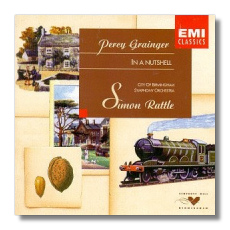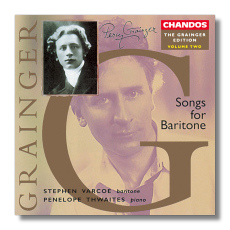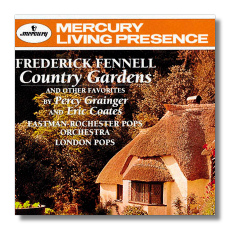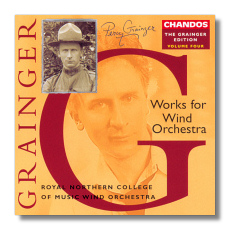
The Internet's Premier Classical Music Source
Related Links
-
Find CDs & Downloads
Amazon - UK - Germany - Canada - France - Japan
ArkivMusic - CD Universe
Find DVDs & Blu-ray
Amazon - UK - Germany - Canada - France - Japan
ArkivMusic-Video Universe
Find Scores & Sheet Music
Sheet Music Plus -
Recommended Links
Site News
Percy Aldridge Grainger
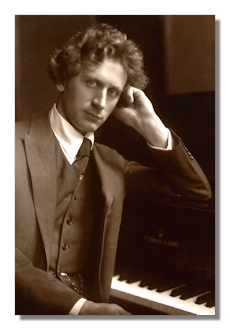
(1882 - 1961)
Born in Brighton, Australia, George Percy Aldridge Grainger (July 8, 1882 - February 20, 1961) – he dropped his first name, mainly because it was his father's – grew up as a polymath. His parents separated early on, and his mother, Rose, became the single most important influence in the boy's life. He very quickly learned the piano and several languages, and through a special subscription, he went to Frankfurt in 1895 for further study. There, the great pedagogue Iwan Knorr taught him composition. However, just as important, Grainger formed lasting friendships with Cyril Scott, Henry Balfour Gardiner, and Roger Quilter, a group known as the "Frankfurt gang." From there, Grainger moved to London and established himself as a virtuoso. During this time, he also went to Berlin for a brief and not particularly happy period of composition study with Ferruccio Busoni. From 1901 to 1914, Grainger went out in the field to collect English folk songs and was one of the first to use a phonographic recorder. This material became the basis of most of his compositional work. He also became friendly with Edvard Grieg (with whom he conversed, to the older man's delight, in Norwegian) and with Frederick Delius. He became a champion of both men's output. Grieg considered him the finest interpreter of the Piano Concerto.
In the meantime, Grainger composed, usually short works that varied folk songs or original tunes that sounded like folk songs. These include such pieces as Shepherd's Hey, Molly on the Shore, Handel in the Strand, and Green Bushes. Some notable exceptions to this type of piece include the "imaginary ballet" The Warriors, Love Verses from the Song of Solomon, and the large choral cycle The Jungle Book, based on Kipling's lyrics, which took him over forty years to complete.
When World War I broke out, Grainger moved to the United States. He served in the war as a bandsman on oboe and saxophone (who knew?) and later as a band director. During this time, he wrote the first version of his best-known score, Country Gardens. This brings up an important point: Grainger to great extent reworked existing pieces for various combinations, often for an ad hoc group of players, sometimes for money. He began to develop what he called "elastic scoring," where the same score could be played by different combinations and numbers of instruments. Country Gardens, for example, went through several versions, the last in the Fifties for a Leopold Stokowski album dedicated to his music.
Grainger's mother, Rose, dominated her son. She limited his contact with his friends, set out his schedule, and even procured his mistresses. Grainger adored her. He told her almost everything. He felt assured of his own genius because his mother told him so. Many of his opinions (including an unfortunate racism and belief in eugenics) came from her. Rose, however, was not merely eccentric, but genuinely crazy. In 1922 she committed suicide by jumping out of a tall building. This both devastated and freed her only son. Six years later, he married in a celebrity ceremony held at the Hollywood Bowl.
One can fairly call Grainger both a musical and a personal eccentric. Sexually, he practiced flagellation (as both whipper and whippee). He had exonerating statements as well as supporting photos to be given to the police in case either he or his wife were found dead under suspicious circumstances, and maintained his "sexual fury" well into his old age. He believed that great composers had blue (or gray) eyes and actually photographed the eyes of several composers he admired (he photo'd Ralph Vaughan Williams twice). Although a true believer in the superiority of Aryan and Nordic "races" and reflexively antisemitic, he nevertheless championed the music of George Gershwin and Duke Ellington. Possessed of frankly unbelievable physical strength and stamina for most of his life, on tour in Australia he would literally run between from one town to another, while sending his luggage ahead by train. He regularly walked to Manhattan from his home in White Plains.
Musically, Grainger went his own way. Even his appropriation of English folk song (which, incidentally, predates both Vaughan Williams, Gustav Holst, and George Butterworth) owes nothing to the rest of the movement. The counterpoint dances with great energy in a rough, idiosyncratic way. Unusual harmonies undergird the tunes, often with sharp dissonances thrown into a generally consonant scheme. To the composer, this reflected his notion that pain and beauty were inseparable. You can usually tell a Grainger piece within a few measures.
He experimented with his own forms, including a Random Round, in which the voices entered when they liked. It was so far ahead of its time, he had to provide a realization so the singers could get through it. His orchestrations are very frequently one-offs. A version of Shallow Brown, for example, uses an orchestra filled with all sorts of strumming instruments and sounds a lot like a giant guitar. Furthermore, from very early on, he wanted to compose music as a painter painted, inspired particularly by the Australian hills. He pioneered electronic music, and while his work bore no immediate fruit, he came up with basic concepts and patents that made possible the MIDI revolution much later. Every weekend warrior who noodles around with a synthesizer and sequencer owes something to Grainger.
After the Forties, Grainger's career faltered as the European avant-garde overran everything in its path. Grainger ran against the times – a brilliant miniaturist at a time when Great Music meant great length and complication and an entertainer rather than a titan in outlook. Critics dismissed him as irredeemably quaint. They ignored him mainly on a priori grounds, rather than on the evidence of the scores, as they did many other composers. Concert audiences no longer demanded to hear him as a performer or as a composer. When he proposed to record his interpretation of the Grieg Piano Concerto, his label, Vanguard, initially turned him down and then stalled until he was well past his prime as a player. Nevertheless, he had his champions, notably Stokowski and Frederick Fennell. Benjamin Britten was able to revive Grainger's work, to the extent that nowadays Chandos has issued a multi-volume set of his works. ~ Steve Schwartz

Recommended Recordings
 Orchestral Music
Orchestral Music
- In a nutshell, Arrival Platform Humlet, Gay but Wistful, Pastoral, The Gum Suckers' March, Train Music, Lincolnshire Posy, Lisbon, Horkstow Grange, Rufford Park Poachers, The Brisk Young Sailor, Lord Melbourne, The Lost Lady Found, Country Gardens, The Warriors/EMI CDC556412-2
-
Malcom Wilson, Roderick Elms, Wayne Marshall (pianos), Simon Rattle & Stephen Frost/City of Birmingham Symphony Orchestra
- The Duke of Marlborough Fanfare, Colonial Song, English Dance, Shepherd's Hey, There Were Three Friends, Fisher's Boarding-House, We Were Dreamers, Harvest Hymn, Blithe Bells, Walking Tune, In a Nutshell, Green Bushes/Chandos CHAN9493
-
BBC Philharmonic Orchestra/Richard Hickox
Vocal Music
- Willow, Willow; Six Dukes Went Afishin'; British Waterside; The Pretty Maid Milking Her Cow; The Lost Lady Found; Creepin' Jane; Bold William Taylor; 4 Settings from Songs of the North; 6 Settings of Rudyard Kipling; Hard Hearted Barb'ra (H)Ellen; The Secret of the Sea; Sailor's Chantey; Shallow Brown/Chandos CHAN9503
-
Stephen Varcoe (baritone), Penelope Thwaites (piano)
- Mock Morris; The Power of Love; Died for Love; Love Verses from The Song of Solomon; Shepherd's Hey!; Early One Morning; The Three Ravens; Scherzo; Youthful Rapture; Random Round (Set version); The Merry King; O Gin I Were Where Gadie Rins; Skye Boat Song; Danny Deever; Irish Tune From County Derry; Dollar and a Half a Day; Molly on the Shore/Chandos CHAN9653
-
Richard Hickox/City of London Sinfonia, Joyful Company of Singers
- My Love's in Germanie; Six Dukes Went A-fishin'; O Mistress Mine; Mary Thomson; Early One Morning; Irish Tune from County Derry; Agincourt Song; Australian Up Country Song; Recessional; At Twilight; The Gipsy's Wedding Day; Mo Nighean Dubh; Ye Banks and Braes O' Bonnie Doon; Soldier, Soldier; Jungle-Book Verses; Near Woodstock Town; Love at First Sight/Chandos CHAN9987
-
Richard Hickox/Academy of St. Martin-in-the-Fields Chorus
Wind Music
- Country Gardens, Shepherd's Hey!, Colonial Song, Over the Hills and Far Away, The Immovable Do, Mock Morris, Handel in the Strand, Irish Tune from County Derry, Spoon River, Molly on the Shore w/ Simpson & Coates/Mercury Living Presence 434330-2
-
Eastman-Rochester Pops Orchestra/Frederick Fennell
- Shepherd's Hey, Lincolnshire Posy, Molly on the Shore, Over the hills and far away, Handel in the Strand, Country Gardens, Irish Tune from County Derry, The Gum-Suckers' March, The Warriors; etc./Gia CD-656
-
North Texas Wind Symphony/Eugene Migliaro Corporon
- Country Gardens, Irish Tune from County Derry, Shepherd's Hey, Hill Song #2, Ye banks and braes o' bonnie Doon, Faeroe Island Dance, The Lads of Wamphray March, Merry King, Molly on the Shore, Colonial Song, Lincolnshire Posy, The Gum-Suckers' March/Chandos CHAN9549
-
Clark Rundell & Timothy Reynish/Royal Northern College of Music Wind Orchestra
- Children's March, Bell Piece, Blithe bells, Immovable Do, The Power of Rome and the Christian Heart, Hill Songs #1 & 2, Marching Song of Democracy/Chandos CHAN9630
-
James Gilchrist (tenor), Clark Rundell & Timothy Reynish/Royal Northern College of Music Wind Orchestra














